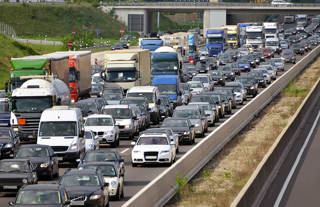A £2 billion plan to promote cycling and walking fails to recognise how commercial fleets will keep towns and cities stocked, says the Freight Transport Association (FTA).
Cities across England are already adopting road layouts to provide more space for cycling and walking as coronavirus restrictions begin to be lifted.
The Government announced the new funding over the weekend to encourage alternative ways to travel, with social distancing rules putting pressure on public transport as people return to work.
Pop-up bike lanes with protected space for cycling, wider pavements, safer junctions, and cycle and bus-only corridors will be created in England "within weeks" as part of a £250 million emergency active travel fund - the first stage of the £2bn investment - it said.
Natalie Chapman, head of urban policy at FTA, told Commercial Fleet: “The published statutory guidance directs councils to reallocate road space for significantly-increased numbers of cyclists and pedestrians, but overlooks access for those who keep our cities supplied with everything they need – logistics vehicles.
“While the Government seeks to encourage active travel and social distancing through its strategy, which are both laudable ambitions, there are many areas affecting the safe movement of goods and services which have been left out of the plan.”
The FTA has written to transport minister Baroness Vere to request urgent clarification.
“The needs of our sector must not be overlooked,” continued Chapman. “FTA is urging authorities to provide reassurance that access to the kerbside for deliveries and servicing activity is maintained at all times – particularly as shops begin to re-open and demand for goods increases – and that any temporary reallocation of road space for walking and cycling be flexed and changed dynamically to reflect changes in demand and to ensure access for vital logistics services.
“Road closures and diversions must consider the increased journey times involved and the potential disruption which displaced traffic could cause on nearby roads.”
She also says it is important that any enforcement against delivery vehicles is “proportionate” and focused on vehicles causing an obstruction to traffic flow or a danger to road safety.
“It would be preferable, too, if restrictions on delivery hours could be reviewed to enable, where possible, for deliveries to take place at times when the roads are quieter, including earlier in the morning, later in the evening, overnight and at weekends to enable businesses to get back on their feet without interruption or delay,” she said.
“Consultations with local businesses are also vital before plans are implemented wherever possible, even though their shop-fronts may be closed, so they can make sure proposals meet their needs when they re-open.
“By working together, we can ensure the final plans for our towns and cities benefit all involved: the safety of citizens, the quality of our air, and the smooth operation of logistics.”
ParcelHero also has its concerns. David Jinks, head of consumer research at the UK courier firm, said: “Of course, it’s in everyone’s interest that people walk and cycle more to get to work ‑ it keeps us fit and reduces pollution - but how many of us actually live within a walk or a bike ride of their workplace? That is not how today’s commuter society has evolved.
“Narrowed roads, rapidly introduced pop-up bike lanes and hastily conceived road closures are exactly what hard-pressed delivery drivers should not have to battle, as they seek to get food orders and goods to people’s doors.”
He also fears that the Government’s plan for people to return to work could hinder home deliveries.
“The new plan specifically states ‘all workers who cannot work from home should travel to work if their workplace is open’. Yet, at the same time, it urges ‘when travelling, everybody (including critical workers) should continue to avoid public transport wherever possible’.
“The result of this new guidance is that jams have already formed on roads leading into London at rush hour this morning, whereas none were seen in cities such as Glasgow, which has not recommended such a return to work without a complete transport plan.
“Increased congestion will make life harder and slow home deliveries, just as we come to increasingly rely on them.”
























john4870 - 12/05/2020 11:50
There is still a world outside of London where walk/cycle are just not viable alternatives that HMG needs to remember. And next we will hear about the increased road deaths for cyclists around London... again.